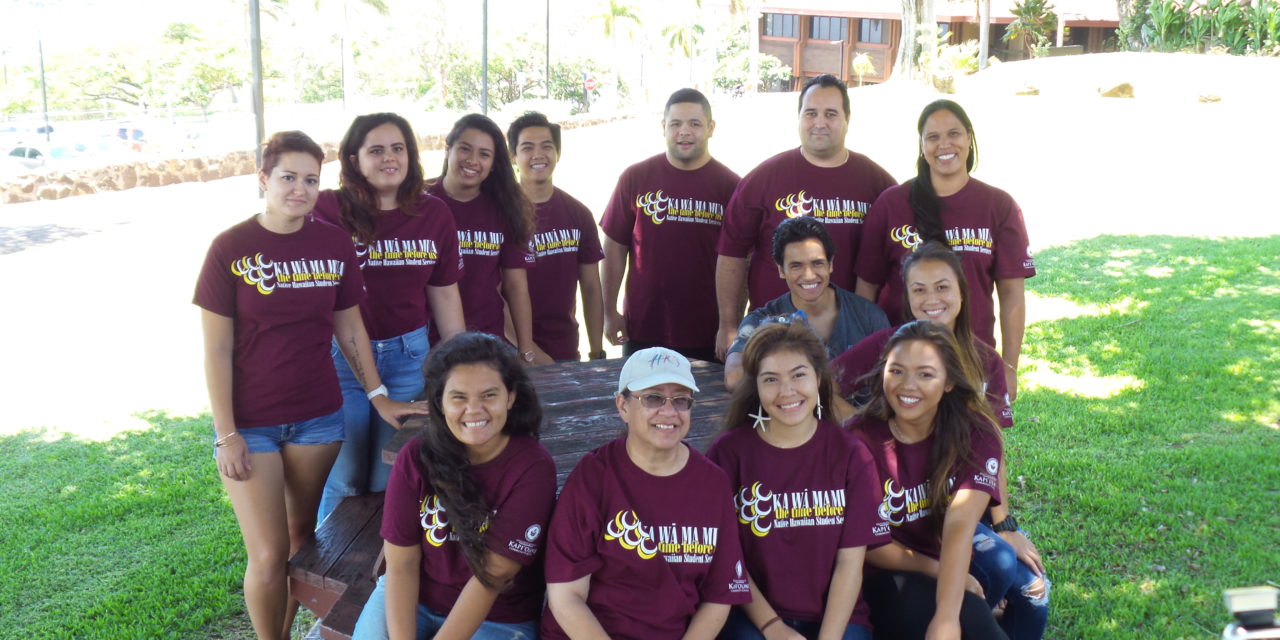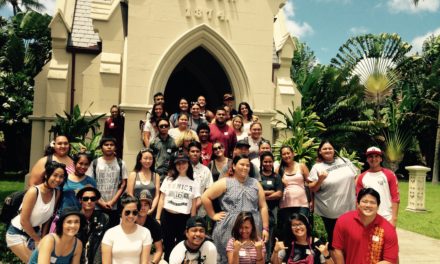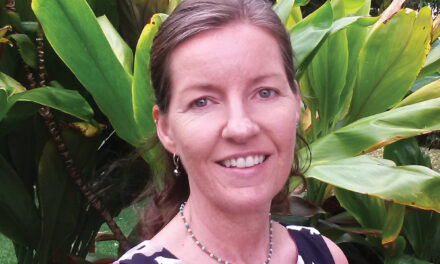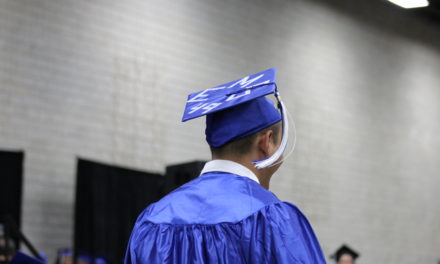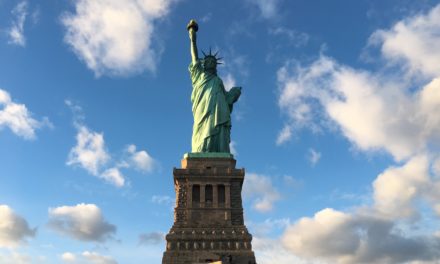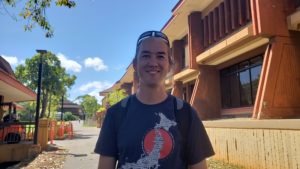By Lexus Yamashiro | Staff Writer
Above Subway in the ‘Iliahi building, many will stumble upon two small offices that open their doors to many advantages and guidance. The Kapo‘oloku Program is the Native Hawaiian Student Success Program that provides assistance and opportunities for Native Hawaiian students attending KCC.
When the program began in May 2014, it was given the name Kapo‘oloku based on who it stood for and what it meant. Michaelyn Nākoa, the coordinator for the Kapo‘oloku Program, stated that she had worked with Nāwa‘a Napoleon, the current dean of Arts & Sciences, to establish an appropriate title for the program.
They had determined that they would name the program after Princess Virginia Kapo‘oloku Po‘omaikelani, the sister of Princess Kapi‘olani, who was deeply rooted in reviving Hawaiian culture.
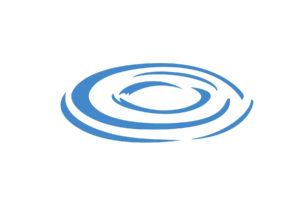
The rippling logo of Kapo’oloku portrays the program’s way of being able to reach out to others in the community. (Photo courtesy of Elizabeth Nākoa)
“We wanted to connect people to their past or genealogy … because we all have multiple identities,” Nākoa said.
The other reason why Kapo‘oloku was chosen as the program’s name was because of its other meaning, based on the concept of a heavy object dropping into water to which it would naturally create a rippling effect.
Nākoa explained that having the rippling effect as the program’s logo is significant since it illustrates the program as a way for students to make an impact on others as they reach out to help people in the community.
For the past 2 1/2 years, the Kapoʻoloku Program has been able to help and guide many students that come to KCC, and still continue to reach out to many more.
Ways that the Kapo‘oloku Program has been able to give back to the community were times when students would go on huaka‘i’s (field trips) to work in the lo‘i (taro patches) and fish ponds.
Other times, Kapo‘oloku students will work in Māla Māunuunu, which serves as an official site for Service and Sustainability Learning in KCC. The māla often hosts group tours and visits along with interdisciplinary learning and community service events.
Along with being able to reach out into the community, the Kapo‘oloku Program is able to help connect students with resources that they would need in order to be successful.
Maele Humel, a third-year student at UH Mānoa, joined the Kapo‘oloku Program after her kumu in her former Hawaiian Studies class had talked about it. Humel was in need of help with tutoring in Hawaiian, which brought her to learn more about the program.
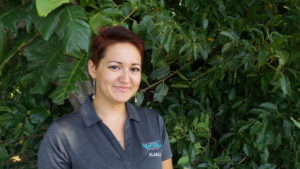
Maele Humel is majoring in Hawaiian Studies at UH Mānoa. (Photo courtesy of Maele Humel)
Humel stated that what drew her interest was the friendliness amongst the students and the cultural activities that the program offers.
“Michaelyn gives us a lot of opportunities to grow and develop our skills and figure out what we want to do in life,” Humel said.
For Humel, being a part of the program has made her realize how much she enjoys helping other students with registration, scholarships, financial aid, and much more.
“I think seeing them first walk through the door completely clueless and helping them … and seeing them do things on their own and graduating … it’s really fulfilling,” Humel said.
Humel also works as a Kapo‘oloku Peer Mentor. As a Kapo‘oloku Peer Mentor, they assist Kapo‘oloku students regarding any questions about KCC, as well as passing down knowledge from one to another.
“Our vision is that we are encouraging student development for Native Hawaiian students,” Nākoa said. “Tying to your genealogy is very important, [and] also we wanted people to have a strong foundation of just knowing who they are.”
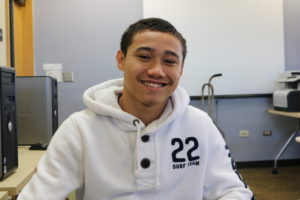
Like Humel, Gambol also plans to major in Hawaiian Studies. (Photo by Lexus Yamashiro)
For first-year student Micah Gambol, he has found the Kapo‘oloku Program helpful in everything.
“They helped me pick classes, [suggested] what teachers are good for me; pretty much whatever is my pace they helped me with,” Gambol said. “[Even] when I told them that I had to drop my English class, they helped me drop my English class.”
Gambol enjoys being able to walk into the program’s office any time to talk story with anyone who’s in. He stated that before he had joined he was a shy student and would not talk with others, however, being in the program has helped him to open up and become more comfortable.
The Kapo‘oloku Program offers a Native Hawaiian tuition waiver that financially helps students within the program. Those that get accepted would have to attend a mandatory program orientation and a 10 day summer bridge program worth three credits.
In addition, students will get notifications from the Kapoʻoloku Peer Mentors and Nākoa along with Hannah Aldridge, the student support specialist, in regards to making sure that the student is on the right track with either registration, STAR holds, financial aid, and much more.
“How would anybody else who’s not involved in a program know [about these student requirements] … that’s kind of what we do besides emails,” Aldridge said. “We also give phone calls, we give students the opportunity to come in and meet with us … it’s beneficial for any first year student really.”
Although the program was designed to help students of Hawaiian ancestry, Nākoa and Aldridge had asserted that they welcome any students who need help or guidance. Aldridge stated that they have several students within their program that are not Native Hawaiian, to which they are pleased with because overall they are concerned about being able to help students be successful.
Nākoa and Aldridge both encourage students to stop by their offices just to say hello or even ask a question.
“We are here to help any student. … We want [them] to be a part of what we’re doing, and we want to be a part of their success,” Nākoa said. “I know we’re called a program, but it’s not like you’re joining a program; just come meet us and talk story.”
For more information, contact the Kapo‘oloku Program at kapnhss@hawaii.edu or call (808) 734-9714.
Visit Michaelyn Nākoa or Hannah Aldridge in ‘Iliahi 231 rooms ‘Ekahi and ‘Elua.
Correction: An earlier version of this story stated that the Hoʻokele Peer Mentors Program had branched out from the Kapo‘oloku Program, which is not the case. Maele Humel is not a Hoʻokele Peer Mentor, but instead a Kapoʻoloku Peer Mentor. It was also stated that Hoʻokele Peer Mentors will send out emails along with Nākoa and Aldridge; Kapoʻoloku Peer Mentors are the ones who send out those emails. We apologize for the errors.

